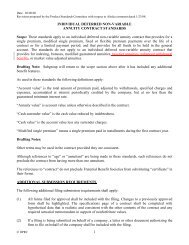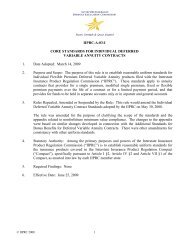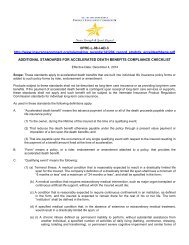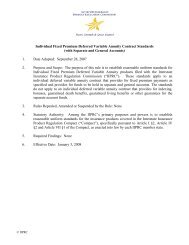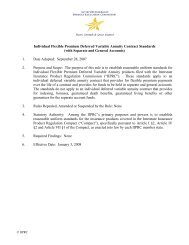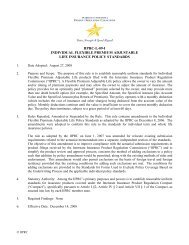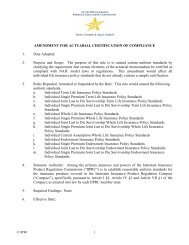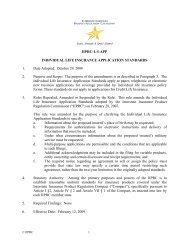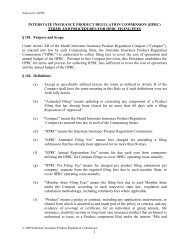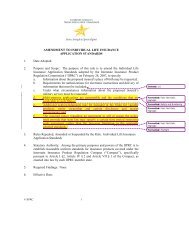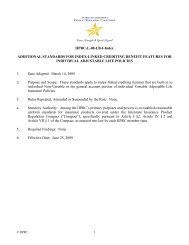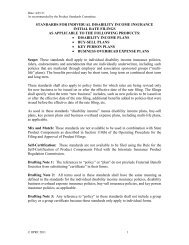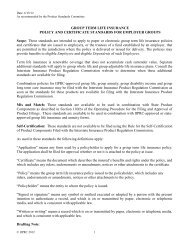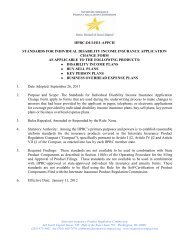core standards for individual long term care insurance policies
core standards for individual long term care insurance policies
core standards for individual long term care insurance policies
You also want an ePaper? Increase the reach of your titles
YUMPU automatically turns print PDFs into web optimized ePapers that Google loves.
Date: 7/13/10<br />
Under review by the Product Standards Committee<br />
Higlighted changes are those added since the 7/6 draft.<br />
(e) (i) “Chronically ill <strong>individual</strong>” has the meaning prescribed <strong>for</strong> this <strong>term</strong> by § 7702B(c)(2) of<br />
the Internal Revenue Code of 1986, as amended. Under this provision, a chronically ill<br />
<strong>individual</strong> means any <strong>individual</strong> who has been certified by a licensed health <strong>care</strong><br />
practitioner as:<br />
(I)<br />
(II)<br />
Being unable to per<strong>for</strong>m (without substantial assistance from another <strong>individual</strong>)<br />
at least two activities of daily living <strong>for</strong> a period of at least 90 days due to a loss<br />
of functional capacity; or<br />
Requiring substantial supervision to protect the <strong>individual</strong> from threats to health<br />
and safety due to severe cognitive impairment.<br />
(ii)<br />
The <strong>term</strong> “chronically ill <strong>individual</strong>” shall not include an <strong>individual</strong> otherwise meeting<br />
these requirements unless within the preceding twelve-month period a licensed health<br />
<strong>care</strong> practitioner has certified that the <strong>individual</strong> meets these requirements.<br />
(f)<br />
(g)<br />
(h)<br />
(i)<br />
(j)<br />
(k)<br />
(l)<br />
(m)<br />
(n)<br />
(o)<br />
“Cognitive impairment” means a deficiency in an <strong>individual</strong>’s short or <strong>long</strong>-<strong>term</strong> memory, orientation<br />
as to person, place and time, deductive or abstract reasoning, or judgment as it relates to safety<br />
awareness.<br />
“Continence” means the ability to maintain control of bowel and bladder function; or, when unable to<br />
maintain control of bowel or bladder function, the ability to per<strong>for</strong>m associated personal hygiene<br />
(including caring <strong>for</strong> catheter or colostomy bag).<br />
“Dressing” means putting on and taking off all items of clothing and any necessary braces, fasteners<br />
or artificial limbs.<br />
“Eating” means feeding oneself by getting food into the body from a receptacle (such as a plate, cup<br />
or table) or by a feeding tube or intravenously.<br />
“Hands-on assistance” means physical assistance (minimal, moderate or maximal) without which the<br />
<strong>individual</strong> would not be able to per<strong>for</strong>m the activity of daily living.<br />
“Home health <strong>care</strong> services” means medical and non-medical services, provided to ill, disabled or<br />
infirm persons in their residences. Such services include homemaker services, assistance with<br />
activities of daily living and respite <strong>care</strong> services.<br />
“Licensed health <strong>care</strong> practitioner” means a physician, as defined in § 1861(r)(1) of the Social<br />
Security Act, a registered professional nurse, licensed social worker or other <strong>individual</strong> who meets<br />
requirements prescribed by the Secretary of the Treasury.<br />
“Maintenance or personal <strong>care</strong> services” means any <strong>care</strong> the primary purpose of which is the provision<br />
of needed assistance with any of the disabilities as a result of which the <strong>individual</strong> is a chronically ill<br />
<strong>individual</strong> (including the protection from threats to health and safety due to severe cognitive<br />
impairment).<br />
“Medi<strong>care</strong>” shall be defined as “The Health Insurance <strong>for</strong> the Aged Act, Title XVIII of the Social<br />
Security Amendments of 1965 as Then Constituted or Later Amended,” or “Title I, Part I of Public<br />
Law 89-97, as Enacted by the Eighty-Ninth Congress of the United States of America and popularly<br />
known as the Health Insurance <strong>for</strong> the Aged Act, as then constituted and any later amendments or<br />
substitutes thereof,” or words of similar import.<br />
“Nursing facility” means a home, residence, or institution, other than a hospital (except <strong>for</strong> a hospital<br />
or hospital unit licensed or certified to provide <strong>long</strong>-<strong>term</strong> <strong>care</strong> services), that is primarily engaged in<br />
providing nursing <strong>care</strong> and related services on an in-patient basis under a license issued by the<br />
Deleted: may<br />
© IIPRC 2010 11



